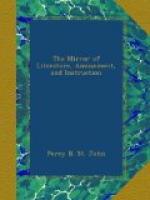* * * * *
Estimating the population of London and its environs at 1,200,000, its proportion of paupers would amount to 100,000!
* * * * *
SCOTCH LIVING.
Roast meat was formerly seldom seen among farmers in Scotland; and is even now rare, compared with its use among the same class in England. Less than half a century ago, a mart was regularly bought or fattened by the most respectable farmers, and even by many citizens. This was a cow or ox killed and salted at Martinmas for winter provision; a custom which, though not uncommon in England, perhaps, one hundred years ago, has certainly not been followed, except in remote and sequestered districts, or by very old-fashioned farmers within that period.
* * * * *
Falstaff’s “Buck-Basket” has puzzled the commentators; but Dr. Jamieson thus explains it:—Bouk is the Scotch word for a lye used to steep foul linen in, before it is washed in water; the buckbasket, therefore, is the basket employed to carry clothes, after they have been bouked, to the washing-place.
* * * * *
PLEASURES OF EGYPT.
Sweet are the songs of Egypt on paper. Who is not ravished with gums, balms, dates, figs, pomegranates, circassia, and sycamores, without recollecting that amidst these are dust, hot and fainting winds, bugs, mosquitos, spiders, flies, leprosy, fevers, and almost universal blindness.—Ledyard’s Travels.—The same writer also says the people are poorly clad, the youths naked, and that they rank infinitely below any savages he ever saw.
* * * * *
There cannot be a more ill-boding sign to a nation, than when the people, to avoid hardships at home, are forced by heaps to forsake their native country.—Milton.
* * * * *
TOBACCO.
As the devil is a deceiver, and hath the knowledge of the virtue of herbs, so he did show the virtue of this herb, that by the means thereof they might see their imaginations and visions that he hath represented unto them.




